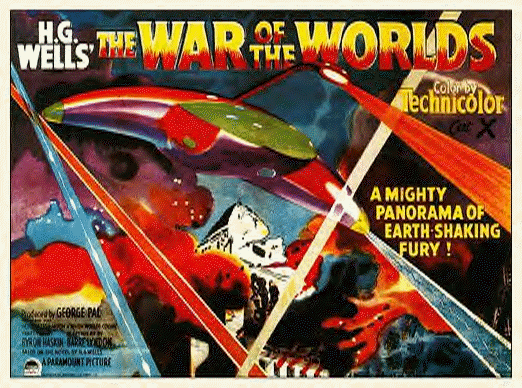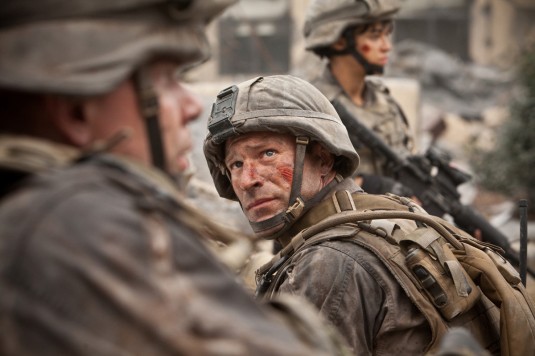Like many people out there, I can not believe that ten years has already passed since the stunning events of September 11, 2001. The anniversary brings to mind the many changes the world has seen in the last decade.
9-11 has had long and far reaching consequences. The events of that infamous day have tested, challenged and, in some cases, radically changed the philosophy and ideology of not just governments but also those of people all over the world as well. The aftermath has affected laws, warfare, security, political debate, economics and, yes, even pop culture
And on the pop culture point, I know what you're thinking; "What about the science fiction
Glad you asked.
Like a lot of good science fiction, the alien invasion movie has often been, in one way or another, allegorical to many of the social, political and international issues and events of the time in which it was made. The decade following 9-11 saw something of a resurgence of the genre.
The alien invasion genre, as we know it today, was first introduced by HG Wells
The European powers had a notorious history of conquest and occupation of cultures and lands more "primitive" than their own in places like Africa,
In War of the Worlds, Wells presented a scenario in which Britain was the "primitive" culture facing an enemy with vastly superior weapons and technology who seemingly regarded humanity as inferior. It's the old "How would you feel is someone did that to you?" argument frequently employed by adults throughout my childhood.
In film, the alien invasion genre really took off in the 50's. The political and historical context of the day played a large role in the success of the genre. At the height of the atomic age
Flash forward to the early 21st century.
There have been a few attempts to make films that deal directly with 9-11. For instance, there was Oliver Stone's World Trade Center
It's times like this that illustrate the beauty of science fiction. When no one can directly address controversial issues, SF comes along, throws an alien or two into the discussions and suddenly, because its got aliens in the story, nobody seems to care one way or the other.
This is the very reason why the decade following 9-11 saw a resurgence of the alien invasion genre.
Let's face it, none of the last decades alien invasion movies are really about aliens. They are about a wide range of issues and emotions directly related to the September 11 attacks and their aftermath.
Here are four examples of the post 9-11 alien invasion movie that fascinate me...
Battle Los Angeles (2011)
Despite its present day urban Los Angeles setting, shaky camera, light flashes, quick editing, pseudo-documentary style and impressive CGI, this movie is as old school a Hollywood war movie as they come. Many critics and Internet commentators have likened Battle Los Angeles to the extremely popular series of combat related video games, Call of Duty.
In essence, Battle Los Angeles is a classic World War II movie
The Marines
The video game inspired alien invasion scenario serves the movie's purposes well. It's escapist dress for a very real post 9-11 commentary on the wars that America is currently fighting. In that sense, the movie serves to rally around audiences around cause in the same way that a movie like, say, the 1943 film Gung Ho Marines
The story of battle Los Angeles focuses on one platoon of Marines trapped behind enemy lines trying to make it back to their base. Of course, the platoon is also saddled with the requisite amount of civilians and wounded to raise the stakes of the drama. To anyone who has even a passing familiarity with the war movie genre, the premise is no doubt a familiar one.
Old war movie heroics are the order of the day for much of the film. After Aaron Eckart's heroic Sargent risks his life to divert the alien enemies away from his platoon, one marine comments "That was some real John Wayne shit, Sargent" while another says, "Who the hell is John Wayne
That's the movie in a nutshell, folks.
Cloverfield (2008)
What could be more 9-11 than that?
In the film, we see, the head of the statue of liberty crash into the streets. Buildings and structures believed to be indestructible are destroyed by a giant rampaging alien monster. Affluent young New Yorkers, previously untouched by any type of strife, conflict or challenges (outside of their CW network prime time soap opera-like personal lives) are suddenly thrust into a world of devastation, widespread social chaos and the specter of imminent death around every corner. Sure, the military is there, trying to defend NYC and its people. While being a strong force for maintaining social order, there appears to be little the armed forces can do about the actual monster itself.
Monsters (2010)
This British film takes a slightly alternate viewpoint of a post 9-11 world. Monsters deals only peripherally with an alien invasion and focuses largely on the human impact of said alien invasion.
The film takes place an unspecified amount of time after alien life forms were brought to Earth after a NASA
Quite the opposite, in fact.
Monsters is a very low key, deliberately paced movie that focuses on the single journey of two people. It reminded me a great deal of another of film about two characters entering into an area supposedly occupied by aliens: Russian director Andre Tarkovsky
Monsters very subtlety looks at many of the post-911 political and social concerns. For instance, questions about the military response to the invasion abound. The point is often raised in the film as to whether the military is deterring the aliens or needlessly exacerbating the situation.
In fact, whether or not this scenario could even be called an "invasion" is debatable. That is a point which speaks to the crux of the matter. Has the situation become an invasion only because the governments of the US and Mexico
Not exactly a Fox News
War of the Worlds (2005)
Steven Spielberg
The book involves a man attempting cross the English country side to get to his wife during a Martian invasion. The movie follows Tom Cruise
Unlike the first film version of the War of the Worlds, Independence Day and a million other alien invasion movies, we never a single scientist, general, president or anyone else of any major authority in the entire movie. Additionally, unlike those other alien invasion movies, we do not see the impact of the attacks on any major cities or landmarks of the world. There is no statue of liberty head falling into the streets of NYC, no exploding White House
The movie keeps many of the books stronger elements. One of the alien tripods (this is one of the rare film versions of the book to keep that detail in tact) attack a crowded ferry filled with alien invasion refugees. It is a sequence that is very close to a similar attack described in the book. The scenes where Cruise and his daughter hole up in a farm house with a borderline psychotic survivalist also bear some resemble to the novel including some lines that are taken verbatim from Wells' text.
Another angle that Spielberg explores with incredible darkness, realism and emotional detachment is the breakdown of social order into mob chaos which ensues in the wake of the invasion. The sequence where an unwieldy mob commandeers Cruise's SUV is starkly powerful.
War of the Worlds is one the more character driven alien invasion movies. It is with the characters that the real post 9-11 themes kick in: ordinary people rising to previously unthinkable challenges. It's not coincidence that (SPOILER ALERT) Cruise is rescued at a crucial moment towards the end of the film by nameless man (with whom he has had no previous relationship) in uniform.
That's the heart of Spielberg's greatly underrated War of the Worlds, people defying both aggressive aliens and social chaos through sheer determination alone. It also helps that and the aliens are finally killed off by (in Wells' words), "disease bacteria against which their systems were unprepared....slain, after all man's devices had failed, by the humblest things that God, in His wisdom, had put upon this Earth."
Wells' words reflect the underlying message of optimism that permeates all of these Post 9-11 alien invasion movies: we will, one way or another get through these nightmare scenarios of death, chaos and destruction.
That much is certain, at least, in the movies, if not in real life as well.








https://strangerinajewishworld.blogspot.com/2021/06/9-11-was-movie.html
ReplyDeletehttps://strangerinajewishworld.blogspot.com/